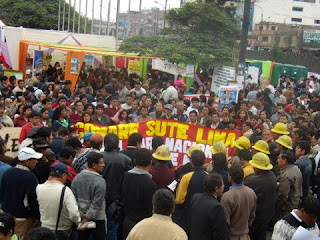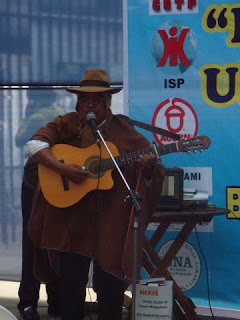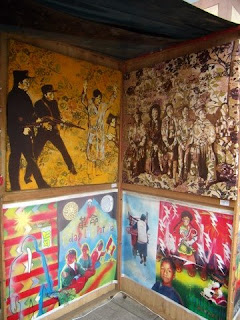“I want the presidents at the summit this week to realise that the people are here – so that it is not just a small group of the biggest capitalists having a discussion and then doing whatever they want. I want them to hear the people”.
So said Abraham Salazar, president of one of Progressio’s partner organisations in Ecuador, the Cotopaxi Indigenous and Campesino Movement (MICC - Movimiento Indígena y Campesino de Cotopaxi).

“This summit is a crucial opportunity for us, the indigenous peoples and nations to make the presidents realise that we are also meeting. We also have a summit and we are demanding our rights: we want them to respect our rights, our opinions and our territories. I hope that there can be a dialogue between the two summits and that they will hear our proposals”.
I spoke to him this afternoon just after he spoke on a panel alongside indigenous leaders from Columbia, Bolivia and Peru at a big meeting on Mining, Natural Resources and Indigenous Communities at the alternative summit. He emphasised how important it is for indigenous peoples to unite in their struggles:
“I think this summit here today is a very important space and a great opportunity to be able to exchange our experiences of our struggles for our land, our natural resources, our indigenous identity and rights.
“Today’s event has been an important forum for debate where we can see the perspectives of different indigenous peoples. I think this has helped to bring us closer together and see how much we have in common: we have the same problems. The way that we are treated by multinationals, how they cheat indigenous peoples, and the multinationals’ policies and practices are the same in all of our countries.
“The issues of mining, water, hydroelectricity and oil are very important issues for all of us. I believe that for a long time the oligarchic powers and the transnationals have just been taking from us – taking our resources, from our territory – in Columbia, Bolivia, Peru and Ecuador and in Chile and Argentina and other poor countries”.


Abraham is working with Fernando Ruiz, a Progressio Development Worker on a project to protect and manage paramos (high altitude scubland that looks like Scotland). Natural Resource management is an issue close to his heart:
“We, the indigenous peoples live in the paramos and in the mountains, in the highest places where there is water. That water is life and without it we will not be able to live. We need to conserve our ways of life – living in harmony between human beings and nature , together in pachamama [the mother earth]. We feel that capitalism and other processes are trying to extinguish all these cultures that we have: our indigenous plurinationality. It is like they are trying to force us all out.
“In Cotopaxi, Since when I first started on the governing council of MICC, I have been trying to work on and promote natural resource conservation. So together with Fernando, I have been working through workshops, and awareness raising in communities and people are starting to be more aware of the issues. Now that I’m a provincial leader I am working on the issues even more.
“As MICC we are putting more and more emphasis on the topic on natural resources and we are not going to drop that work – we are very involved in water, mining, the struggles against hydroelectric plants. Indigenous peoples are resisting . For example they want to give 50 year water concessions to big hydroelectric plants and mines and we are saying “No way, that is not going to happen when we can see that in other places, people are dying of thirst or hunger”.
“The government needs to start thinking about water by first of all prioritizing everybody having water. And looking at it from the perspective of Food Sovereignty – we are being turned into consumers – consumers who consume products imported from elsewhere. And what are we doing with our local produce, our native seeds?”

Abraham came to the summit with a small delegation from Ecuador to participate in the full week’s activities including an indigenous nations summit which took place on Monday. He believes the summit has helped to strengthen the movement at a regional level and strengthen MICC’s work in Cotopaxi:
“I think we will leave this summit at the end of the week with much more information and much stronger. In Ecuador I think we will be able to act in a much stronger way. I am seeing that Rafael Correa, the president in Ecuador has an internal position which is neoliberal and then an external one which is supposedly in favour of the poor but really it isn’t. He is cheating us and we cannot let that happen – behind what he is saying, he is pushing forward mining and hydroelectric power stations.
“We need to push for a total change in our countries so that they respect our culture, our forms of governance, our natural resources and our autonomy as indigenous peoples. I think that the summit has really helped us and now we need to keep in touch, keep strengthening our links and supporting each other, because the only way we are going to live well as is through our own struggles for indigenous rights”.
______________________________
Elsewhere at the summit, the activities continued with a packed day of workshops, fringe meetings and discussions. I went to a couple of interesting sessions on climate change, which is an important theme at the summit, interestingly, being addressed not just by environmental organisations but also by women’s organisations, human right groups and indigenous groups. The emphasis is on the issue as something which will have wide-ranging ramifications and which we all need to adapt to and tackle.

Outside the summit, preparations continued for the LAC-EU summit which starts on Friday. The chaos on the roads is impressive with extensive sections of road shut down and police ID checks on many streets; the international delegations are arriving; labour unions are threatening to strike during the summit to highlight their concerns; and Garcia, the President, created Peru’s first environment ministry and spoke on his proposal for a global fund to finance reforestation which could reforest ten million hectares could be reforested annually.
A few shots of the other activities at the summit: art for change, dancing and cultural displays, stalls, and the women's tent



















 Self expression: a huge crowd watch theatre at the summit yesterday
Self expression: a huge crowd watch theatre at the summit yesterday Diana Torres
Diana Torres


 People peering in to packed forum from outside the tent
People peering in to packed forum from outside the tent

 A song about injustice and water rights in Tacna, Peru
A song about injustice and water rights in Tacna, Peru






















 The Permanent Peoples’ Tribunal was apparently set up in 1979 as an international opinion tribunal, to examine and judge complaints of human rights violations submitted by the victims themselves or groups representing them. This session of the tribunal is focused on the actions of European multinationals in Latin America.
The Permanent Peoples’ Tribunal was apparently set up in 1979 as an international opinion tribunal, to examine and judge complaints of human rights violations submitted by the victims themselves or groups representing them. This session of the tribunal is focused on the actions of European multinationals in Latin America.
